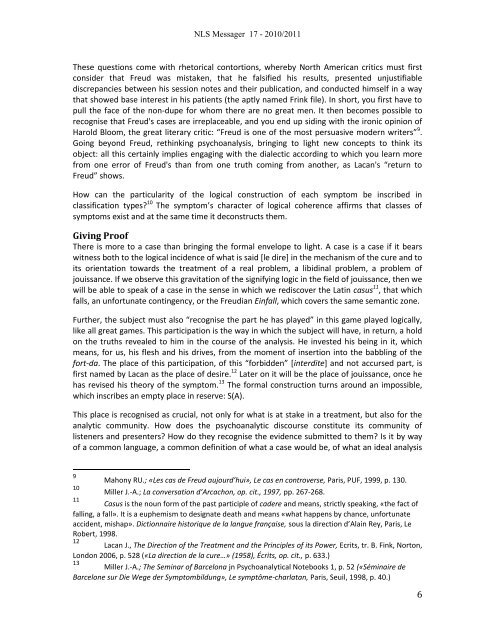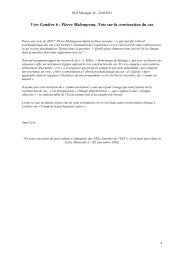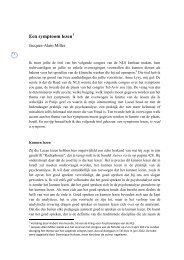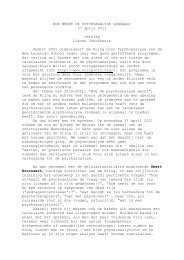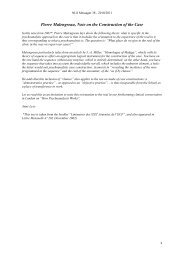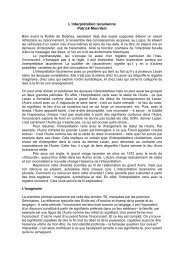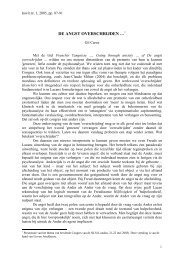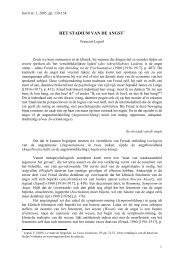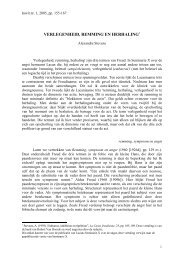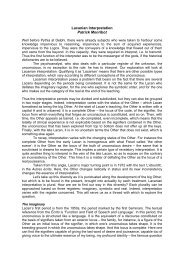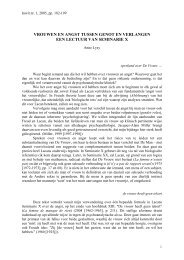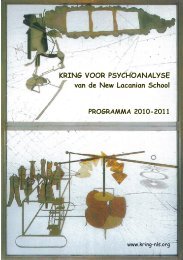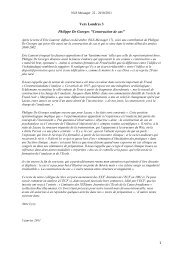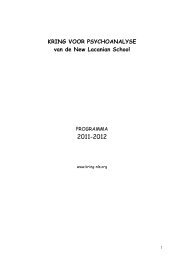Vers Londres 2 Eric Laurent, « Le cas, du - Psychoanalyse Lacan ...
Vers Londres 2 Eric Laurent, « Le cas, du - Psychoanalyse Lacan ...
Vers Londres 2 Eric Laurent, « Le cas, du - Psychoanalyse Lacan ...
You also want an ePaper? Increase the reach of your titles
YUMPU automatically turns print PDFs into web optimized ePapers that Google loves.
NLS Messager 17 - 2010/2011<br />
These questions come with rhetorical contortions, whereby North American critics must first<br />
consider that Freud was mistaken, that he falsified his results, presented unjustifiable<br />
discrepancies between his session notes and their publication, and con<strong>du</strong>cted himself in a way<br />
that showed base interest in his patients (the aptly named Frink file). In short, you first have to<br />
pull the face of the non-<strong>du</strong>pe for whom there are no great men. It then becomes possible to<br />
recognise that Freud's <strong>cas</strong>es are irreplaceable, and you end up siding with the ironic opinion of<br />
Harold Bloom, the great literary critic: “Freud is one of the most persuasive modern writers” 9 .<br />
Going beyond Freud, rethinking psychoanalysis, bringing to light new concepts to think its<br />
object: all this certainly implies engaging with the dialectic according to which you learn more<br />
from one error of Freud's than from one truth coming from another, as <strong>Lacan</strong>'s “return to<br />
Freud” shows.<br />
How can the particularity of the logical construction of each symptom be inscribed in<br />
classification types? 10 The symptom’s character of logical coherence affirms that classes of<br />
symptoms exist and at the same time it deconstructs them.<br />
Giving Proof<br />
There is more to a <strong>cas</strong>e than bringing the formal envelope to light. A <strong>cas</strong>e is a <strong>cas</strong>e if it bears<br />
witness both to the logical incidence of what is said [le dire] in the mechanism of the cure and to<br />
its orientation towards the treatment of a real problem, a libidinal problem, a problem of<br />
jouissance. If we observe this gravitation of the signifying logic in the field of jouissance, then we<br />
will be able to speak of a <strong>cas</strong>e in the sense in which we rediscover the Latin <strong>cas</strong>us 11 , that which<br />
falls, an unfortunate contingency, or the Freudian Einfall, which covers the same semantic zone.<br />
Further, the subject must also “recognise the part he has played” in this game played logically,<br />
like all great games. This participation is the way in which the subject will have, in return, a hold<br />
on the truths revealed to him in the course of the analysis. He invested his being in it, which<br />
means, for us, his flesh and his drives, from the moment of insertion into the babbling of the<br />
fort-da. The place of this participation, of this “forbidden” *interdite] and not accursed part, is<br />
first named by <strong>Lacan</strong> as the place of desire. 12 Later on it will be the place of jouissance, once he<br />
has revised his theory of the symptom. 13 The formal construction turns around an impossible,<br />
which inscribes an empty place in reserve: S(A).<br />
This place is recognised as crucial, not only for what is at stake in a treatment, but also for the<br />
analytic community. How does the psychoanalytic discourse constitute its community of<br />
listeners and presenters? How do they recognise the evidence submitted to them? Is it by way<br />
of a common language, a common definition of what a <strong>cas</strong>e would be, of what an ideal analysis<br />
9<br />
Mahony RU.; «<strong>Le</strong>s <strong>cas</strong> de Freud aujourd’hui», <strong>Le</strong> <strong>cas</strong> en controverse, Paris, PUF, 1999, p. 130.<br />
10<br />
Miller J.-A.; La conversation d’Arcachon, op. cit., 1997, pp. 267-268.<br />
11<br />
Casus is the noun form of the past participle of cadere and means, strictly speaking, «the fact of<br />
falling, a fall». It is a euphemism to designate death and means «what happens by chance, unfortunate<br />
accident, mishap». Dictionnaire historique de la langue française, sous la direction d’Alain Rey, Paris, <strong>Le</strong><br />
Robert, 1998.<br />
12<br />
<strong>Lacan</strong> J., The Direction of the Treatment and the Principles of its Power, Ecrits, tr. B. Fink, Norton,<br />
London 2006, p. 528 («La direction de la cure…» (1958), Écrits, op. cit., p. 633.)<br />
13<br />
Miller J.-A.; The Seminar of Barcelona jn Psychoanalytical Notebooks 1, p. 52 («Séminaire de<br />
Barcelone sur Die Wege der Symptombil<strong>du</strong>ng», <strong>Le</strong> symptôme-charlatan, Paris, Seuil, 1998, p. 40.)<br />
6


